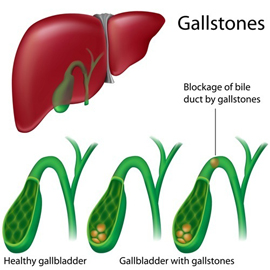Gallstones are a very common problem especially amongst obese people. This primarily happens when cholesterol levels are very high or when fatty deposits are higher than normal levels. The substance produced in the liver responsible for emulsifying fats in the digestive system is called bile. It is a green liquid that keep the cholesterol in suspended form.
However, when the cholesterol reaches very high levels the bile is unable to keep it suspended and it begins to form lumps and stones. These are known as gall stones.

It has been estimated that almost 25% of all obese people suffer from gall stones. In fact the condition can be so severe that it often necessitates a surgical procedure. Obesity is also often characterized by a high level of cholesterol in the bloodstream. This further aggravates the problem of gall stones.
Women are more susceptible to gall stone attacks than men. Also when excess fat gets accumulated around the mid-section of the body it makes a person more prone to gall stones. The more weight is accumulated around the waist, the higher the risk of getting gall stones.
An unfortunate side effect of rapid weight loss such as is usually experienced after weight loss surgery is the formation of gallstones. Some sources say that gallstone formation can be found in as many as 35% of weight loss surgery patients. Because of this, bariatric surgeons often put their patients on a 6 month course of a preventative medication such as Actigall. Because the weight loss in lap-band patients is slower, it is not as common for these patients to be prescribed anti-gallstone medication. In other cases if the patient has a history of gallstones, the gallbladder may be removed at the time of the bariatric surgery.
Small stones are often without symptoms and are often detected incidentally during other diagnostic tests. Once they achieve a size that is large enough to block the outlet from the bile storage organ called the gallbladder, a gallstone attack occurs. The common symptoms of any gallstone attack typically starts with an acute pain over the upper abdomen. This pain can last for 30 minutes to several hours. For some people the pain could be towards the right shoulder and is accompanied by nausea and vomiting.
The usual treatment for gallstone attacks is removal of the gallbladder in an operation called a Laparoscopic Cholecystectomy. Fortunately, the gallbladder is no longer a vital organ since our fat intake is substantially less than our early ancestors so a bile storage organ is not essential and people do fine without one.